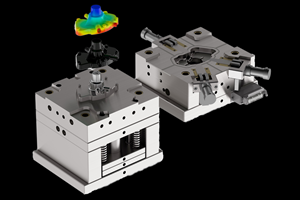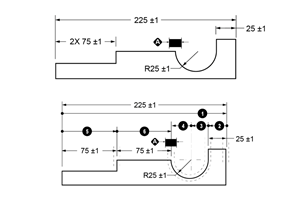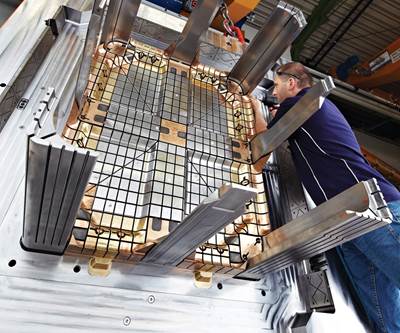Enhancing Global Manufacturing Visibility: How Digital Moulds Solved SKF's Data Accessibility Challenges
SKF improved global manufacturing visibility and data accessibility through Digital Moulds' cloud-based monitoring system, enhancing real-time machine status tracking.

Mould monitoring offers numerous possibilities for keeping an eye on the production process.
Source: Digital Moulds
Many companies are focusing on digitalization. Global corporations especially need access to various data from anywhere, at any time. Digital Moulds' products help companies better understand their data and gain an information advantage. Digital Moulds recently completed one such project with SKF.
SKF Seals, a division of SKF, started a digitalization project to connect, digitalize and visualize all their machines. This project aims to display each machine's status and production data, keeping the facility and entire operation running smoothly across all locations.
The first step was to assess each facility’s digitalization level by checking available systems, infrastructure and connectivity. They also defined specific requirements for secure data collection. The goal was to determine how SKF could use big data effectively.
Previously, there was no machine data available after commissioning. It was unclear whether machines at separate locations were running or not. This lack of information made it difficult to monitor process development and determine when a project could be handed over. This is where Digital Moulds came in with Mould Monitoring -- cloud-based software that can be used on any device, allowing companies to quickly add users worldwide and enabling all colleagues to work with the data.
After initial discussions, a pilot project was quickly set up. The first devices were installed in a live version at low cost. A system with motion detectors was designed to check if data was being transmitted. The installation began at the Leverkusen site to gain experience before expanding to other locations.
The test run in Mexico coincided with the COVID-19 pandemic, preventing SKF technicians from traveling. However, the motion detector's signal allowed for remote control. Despite the complex commissioning process, good cooperation with Digital Moulds made it successful. An on-site electrician connected the equipment within an hour, providing SKF with reliable information.
"The good thing is that I can check at any time, even from the pool bar on vacation, if necessary, whether the machine is running and it's really easy. That's one of the reasons why I'm so happy with Digital Moulds!"- Rejnold Macasek, Manufacturing & Process Development – SKF
SKF is still in the early stages of digitalization, but they already need information for their current processes. This data helps technicians assess individual machine conditions and make further improvements.
SKF plans to continue this approach with modern digitalization methods. The system was recently introduced in China and will soon be installed in Bulgaria. Additional sensors for plastic injection molding machines were sent to Mexico to collect more information regardless of location and time.
SKF wants to know if a machine is running and its current cycle. This aligns with other customers like BMW, who are primarily interested in the system's overall condition rather than detailed sensor data.
After the successful test phase, SKF has started collecting other parameters using the same machine sensor. They plan to gather information on temperature in the future. If the sensors are installed, these options can be easily activated on the Mould Monitoring Box. Upgrading to the "Professional" version is also simple, requiring only activation by Digital Moulds.
SKF appreciates that new processes are first tested at the Leverkusen site before being implemented elsewhere. Digital Moulds supports this approach and assists SKF in all aspects of their system.
Related Content
Tips for Tackling Mold Design, Machining, Cutting Tool and Wear Challenges
Tips for tasks ranging from reducing risk in part design and taking advantage of five-axis machining to refining cutting tool performance and reducing wear with guiding and centering systems.
Read MoreWhat Is Scientific Maintenance? Part 1
Part one of this three-part series explains how to create a scientific maintenance plan based on a toolroom’s current data collection and usage.
Read MoreTolerancing in Mold Design, Part 1: Understanding the Issues of Conventional Bilateral Tolerancing
Mold designers must understand the location, orientation and form limitations of conventional tolerancing before changing to another dimensioning system.
Read MoreHow to Improve Your Current Efficiency Rate
An alternative approach to taking on more EDM-intensive work when technology and personnel investment is not an option.
Read MoreRead Next
Putting Recycled Plastics to Work
Haidlmair discovered that if recycling is done correctly, the difference between virgin and recycled plastic material is minimal.
Read MoreIoT Mold Sensors, Mobile Application Attain More Accurate Digital Mold Management
eMoldino’s next-generation solution anticipates improvements in quality, scope and reach for more accurate and advanced data capture through a more intuitive experience.
Read MoreMMT Chats: Austrian Mold Builder Talks Reusable Masks, Motivation and Digital Molds
MoldMaking Technology’s Christina Fuges chats with some of the Haidlmair team—CEO Mario Haidlmair, Head of Corporate Communications Peter Peschl (Austria) and COO/Sales for Haidlmair NA Angelo Morra (Canada)—about a reusable mask project to help fight COVID-19 as well as the role of digital molds today.
Read More




















